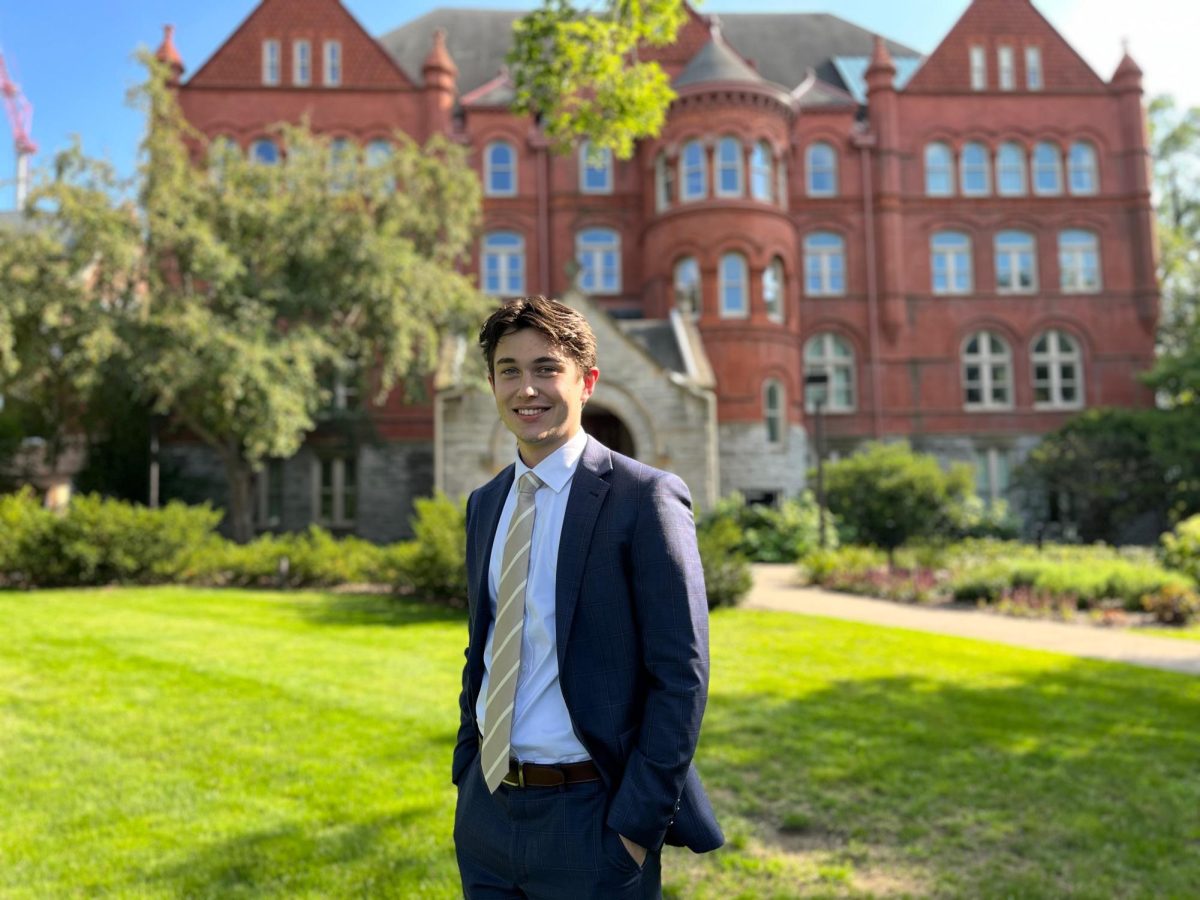
After weeks of discussion, MPIRG and MCSG’s contract negotiations were postponed until the fall after a Judicial Council decision ruled this spring’s MPIRG referendum invalid due to procedural violations. MCSG President Kai Wilson ’14 explained the situation to a packed Weyerhaeuser Boardroom Tuesday night, saying the invalidation was caused by “procedural errors by the [Elections Procedures Committee] because we did not hold a forum.”
This ruling prompted two separate resolutions; one to push the referendum back to Fall 2014 and another to use the contract that MPIRG and MCSG renegotiated over the past few weeks be used as the template for renegotiation in the fall. Those in support and opposition of MPIRG funding voiced their opinions as the two resolutions went before the legislative body. After a debate which brought many students into the Weyerhaeuser Boardroom, both items passed.
Instead of holding another referendum before the end of the semester, MPIRG leadership proposed that a new vote be held in the fall semester to allow enough time to raise campus awareness of the referendum and avoid low voter turnout.
“I think the real way to have an informed student body is to do this in the fall,” said MPIRG co-chair Grace Putka ’16. Fellow co-chair Miranda Adams ’15 agreed.
“This is the best way we can have future discussions about MPIRG on campus,” she said.
Danny Surman ’14 spoke on the first resolution. Surman and others in opposition to the MPIRG contract and earlier referendum had compiled and handed out a document of suggested amendments titled “Fix the MPIRG Contract.”
“We’re glad [MPIRG] have reversed their position,” Surman said. “We support this.”
The resolution to move the referendum to the fall passed with no further discussion.
The following resolution revolved around using the contract that MPIRG and MCSG had been negotiating for the past three weeks as the basis for renegotiations in the fall. Discussion was again opened to all those present at the meeting.
Elliot Averett ’15, another student in opposition to the resolution, spoke first.
“There’s a lot [of] people here today who have concerns about this contract,” he said, stating that he believed that the contract did not “provide accountability” for the opt-out system that MPIRG uses to fund itself.

Indeed, most of the opposition spoke to either their concerns about continuing the opt-out process, in which students can decide whether or not to give 6 dollars of their student activity fee per semester to MPIRG, or about their confusion regarding this practice.
Other concerns were raised about the process the referendum had followed and the renegotiation of the contract that was introduced to MCSG last week.
“Process is important and process needs to be followed,” Averett said.
Surman spoke of the importance of allowing more of the student body to participate in the renegotiation process.
“When I look at this [contract], there were two sides represented,” he said, alluding to a press release that the opposition had created prior to the meeting, where they stated that the referendum had “disenfranchised hundreds of students.”
“But now it’s time to have our voices included,” Surman added.
“This is a recommendation, this is not binding,” Adams said, pointing out that approving the resolution would not equal adopting the renegotiated contract.
MCSG representative Merita Bushi ’14 agreed, saying that the contract we have in front of us is “drastically different” from the one that MCSG and MPIRG had started out with, pointing out the compromises and work put in by both parties.
“I think it would be incredibly irresponsible to start from scratch next year,” Bushi said.
Because so much of the conversation focused on the opt-out and what many perceived to be the unfairness of that financial situation, Putka took the opportunity to try to clarify how the system worked.
“No matter your political beliefs, you’re funding both Mac Dems and Mac GOP,” she said, referring to the distribution of the student activity fee across all student organizations, and MPIRG is the only organization with an opt-out option.
“It’s actually an extra level of protection for the students, and I want to make sure it gets recognized as such,” she said.
After more discussion by both sides, MCSG representative James Lindgren ’15, who had been a part of the negotiation process with MPIRG, suggested a compromise on the resolution.
“I move to amend the resolution to include the five-page document by the opposition,” he said. This meant that the base for renegotiating in the fall would include both the recommended contract from MCSG and the opposition’s proposed amendments.
The amendment was well-received by the writers of the resolution, and after a few more comments from both sides, the resolution was put to a vote and passed.
MCSG Chief of Staff Ian Calaway ’16 thanked the guests for their attendance and participation, and keeping the conversation “very respectful on both sides.”
Negotiations will resume in the fall, with new members of all parties taking part in the new referendum and contract.






Isaac Payne • Sep 11, 2019 at 10:30 am
I have been exploring for a little bit for any high-quality articles or blog posts on this kind of area . Exploring in Yahoo I at last stumbled upon this website. Reading this info So i’m happy to convey that I have a very good uncanny feeling I discovered exactly what I needed. I most certainly will make sure to don’t forget this site and give it a glance on a constant basis.
Chloe Poole • Sep 10, 2019 at 5:09 am
After I originally left a comment I appear to have clicked on the -Notify me when new comments are added- checkbox and from now on every time a comment is added I get 4 emails with the same comment. Perhaps there is a means you can remove me from that service? Many thanks!
Fiona Peters • Sep 8, 2019 at 4:38 pm
Why YouTube video clips are shared everywhere? I think one motive is that these are straightforward to take embed script and paste that code somewhere you want.